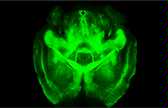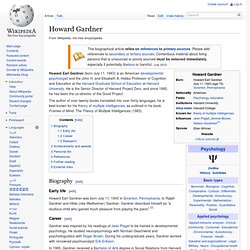

Howard Gardner. Howard Earl Gardner (born July 11, 1943) is an American developmental psychologist and the John H. and Elisabeth A.

Hobbs Professor of Cognition and Education at the Harvard Graduate School of Education at Harvard University. He is the Senior Director of Harvard Project Zero, and since 1995, he has been the co-director of the Good Project. The author of over twenty books translated into over thirty languages, he is best known for his theory of multiple intelligences, as outlined in his book Frames of Mind: The Theory of Multiple Intelligences (1983). Biography[edit] Early life[edit] Howard Earl Gardner was born July 11, 1943 in Scranton, Pennsylvania, to Ralph Gardner and Hilde (née Weilheimer) Gardner. Career[edit] In 1965, Gardner received a Bachelor of Arts degree in Social Relations from Harvard University. He began teaching at the Harvard Graduate School of Education in 1986. Research[edit] Achievements and awards[edit] Personal life[edit] Gardner is married to Ellen Winner.
Psych/Lab Software. The Psych/Lab (TM) software contains programs to run versions of classic experiments from Human Cognitive/Experimental Psychology.

The programs allow some (but not too much) control over parameters of their operation, provide raw trial data in text files, include analysis programs to compute condition means, and they are free! There is also a program that allows one to run their own reaction time experiment. The software has been in use since before 1990 for the Experimental Psychology course at Washington University, and in many other places around the world. You can use any of the programs for teaching or research, and you can distribute them to others for the same purposes but do not sell the software or otherwise use the programs or documentation for any commercial purpose without contacting the author first. To learn more about the programs in general, click here.
To learn more about the specific experiments, see the section "Individual experiment programs" below.
AU Psychology Resources. The Mechner Foundation. The Paideia Individualized Education (PIE) Model F.

Mechner, V. Fiallo, T. Fredrick, & T. Jenkins, 2013. In 1968 at the Armonk Paideia School, Mechner introduced a novel approach to K-12 education—one that applies what is known about education, the learning process, organizational theory, and psychology. There are no grades or classes in the PIE model--every student is educated as a unique individual, with a customized learning plan consisting of learning objectives drawn from a large relational database. Most students advance by more than one grade level per year as they routinely make explicit commitments to achieve specific learning objectives. How Can One Specify and Teach Thinking Skills? Remarks Regarding Charles Catania's 1981 Discussion Article "The Flight From Experimental Analysis" F. Mechner, F. (2012). Why Behavior Analysis Needs a Formal Symbolic Language for Codifying Behavioral Contingencies F. Mechner, F. (2011). Mechner, F., & Jones, L. (2011).
Testimony of Dr. Encyclopedia of Psychology - Psychology Websites. Good reads in psychology.